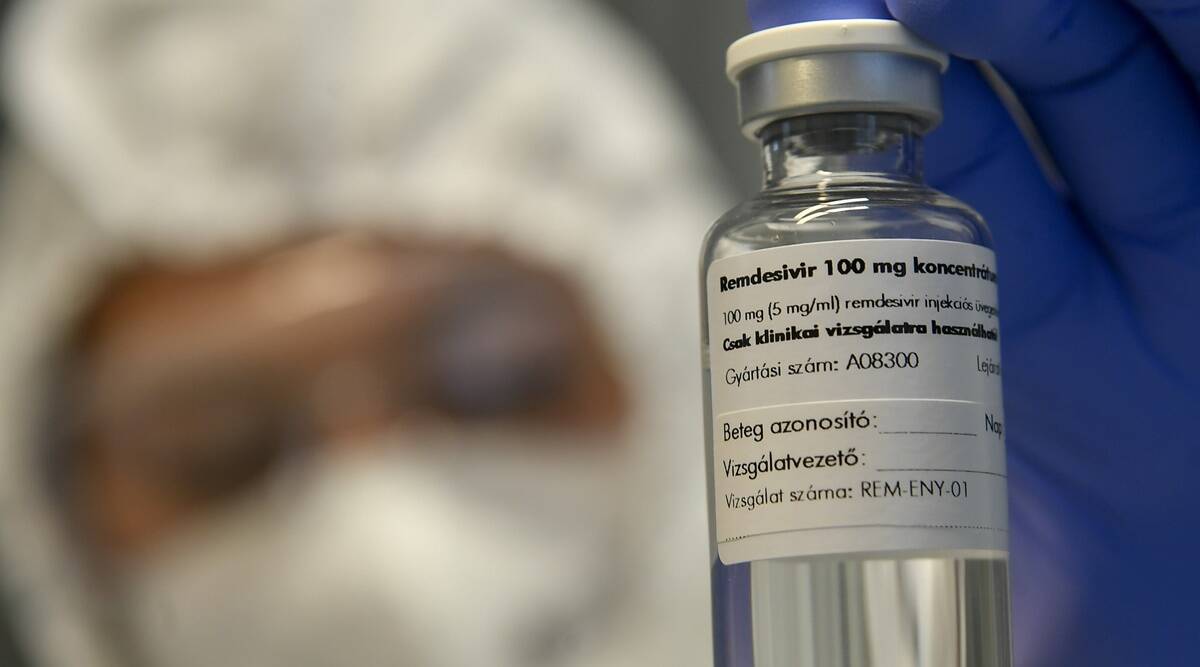 The number of active infections has reached close to 10 lakh, half of which are in Maharashtra that requires 40,000-50,000 vials of Remdesivir, up from 30,000 vials per day during first the “peak” last year. (Source AP)
The number of active infections has reached close to 10 lakh, half of which are in Maharashtra that requires 40,000-50,000 vials of Remdesivir, up from 30,000 vials per day during first the “peak” last year. (Source AP) Manufacturers of Remdesivir said a lull in demand from December to February led to low or zero production of the anti-viral drug for three months, which subsequently affected its supply chain. The manufacturers said they did not anticipate such a sudden surge, and that it would take at least 10 days to overcome the shortage.
Maharashtra, Delhi, Gujarat, Chhattisgarh and Madhya Pradesh have reported a shortage of Remdesivir as Covid-19 cases surge. India has been reporting over a lakh fresh cases for the past couple of days. The number of active infections has reached close to 10 lakh, half of which are in Maharashtra that requires 40,000-50,000 vials of Remdesivir, up from 30,000 vials per day during first the “peak” last year.
The Central government has asked all seven manufacturers — Mylan, Hetero Healthcare, Jubilant Life Sciences, Cipla, Dr Reddy’s Laboratories, Zydus Cadila and Sun Pharmaceuticals — to scale up to their maximum capacity of 31.6 lakh vials per month.
Prafulla Khasgiwal, senior VP, Hetero Healthcare that can manufacture 10.5 lakh vials a month, said, “From December to February, we came down to 5-10 per cent of our production as there was no demand. We started scaling up from mid-March but it takes time to gear up.”
Khasgiwal said they require 25 raw materials (active pharmaceutical ingredients, packaging material, etc.) to produce Remdesivir. “We had no inventory. We had to procure and our suppliers could not deliver quickly,” he added. At present, Hetero can manufacture 35,000 vials in a day or two.
It takes around five days to produce Remdesivir. The drug then undergoes a 14-day sterility test and requires around three days for transportation in 2-8 degrees Celsius. The entire cycle takes 20-25 days. Most manufacturers scaled up their production in March, but raw material supply and transportation remain an issue due to restrictions in states in view of the rising Covid-19 cases.
Dr D J Zafar, MD in Kamla Lifesciences that supplies Remdesivir to Cipla, said they shut production from December 31 to March 1. “A lot of stock had to be liquidated last year due to low demand. This time, the demand is unprecedented and we could not match its pace,” he added.
Kamla Lifesciences will begin manufacturing liquid Remdesivir from April 15 and plans to produce 2 lakh vials a day. Currently, it is manufacturing the powdered form that takes 72 hours to be made. Zafar said the shortage will be plugged in 10 days. Cipla said they are “in the process to optimise supplies further”.
Deepak Sapra, CEO (APIs and Services), Dr Reddy’s, said they are preparing to meet the additional demand. At present, Cipla can manufacture 6.2 lakh vials a month, while Zydus and Mylan can produce 5 lakh and 4 lakh vials a month, respectively.
A Mylan spokesperson said, “We are closely partnering with the government to meet the patient needs in India and ensure access to this critical medicine.”
Dr J B Mantri, former joint commissioner (drugs) in Maharashtra Food and Drug Administration who retired earlier this year, said there were excessive Remdesivir stocks last year with distributors forced to liquidate expired vials.
“Manufacturers scaled up production to maximum capacity and could not sell all stock. This is why this time they were cautious and did not anticipate the huge demand,” he added.
The high demand has led to instances of hoarding and inflated prices. Patients in Maharashtra have complained of buying Remdesivir for Rs 7,000-10,000, against the maximum retail price ranging between Rs 2,800-5,400.
Mumbai Police raided two places this week and seized 297 vials of the drug. Experts also raised concerns over rampant prescription of the drug for patients who will not benefit.
Dr Sudhakar Shinde, chairing a committee for price regulation of Remdesivir in Maharashtra, said the state will announce price capping of the anti-viral drug by this week. The Maharashtra FDA also wrote to the National Pharmaceutical Pricing Authority to bring Remdesivir under price control, seeing the surge of its usage during the pandemic.
- The Indian Express website has been rated GREEN for its credibility and trustworthiness by Newsguard, a global service that rates news sources for their journalistic standards.

